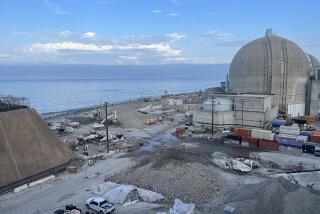Mistrial Declared in Ex-Worker’s Suit Against San Onofre
- Share via
SAN DIEGO — A federal judge declared a mistrial Tuesday after a jury deadlocked 7 to 2 in favor of a former nuclear inspector who claimed that the operators of the San Onofre nuclear plant were negligent and that she contracted cancer from leaking radiation.
Federal Magistrate Rudi Brewster set March 1 for a retrial in the case of Rung C. Tang, a former inspector for the Nuclear Regulatory Commission who is suffering from chronic myelogenous leukemia.
Juror John Bergamo said a majority of the panel were convinced that Tang was exposed to a dangerous level of radiation and that the plant’s majority owner, Southern California Edison, showed callous disregard for workers’ safety.
“Before the trial, I was a supporter of nuclear power,” said Bergamo, 44, a machinist. “Now I’m not so sure. The basic philosophy (of Edison) seems to be that if you work at San Onofre you’re going to be contaminated. That’s terrible.”
Tang’s attorney, Don Howarth, said his client is open to a settlement to avoid a second trial, but Edison Vice President Dick Rosenblum said the company looks forward to the retrial. Before the trial, Tang had offered to settle for $10 million.
“This was a very complex, technical case with a lot of emotion,” Rosenblum said. “The evidence by the experts showed that Ms. Tang’s illness was not connected to her time at San Onofre. The jury simply didn’t appreciate that.”
Bergamo said he thought the evidence showed that Edison put profits above safety, a major contention of Tang’s attorneys. “They could have bought new (protective) suits for workers but it would have cost $4 million so they didn’t,” Bergamo said.
To find in favor of Tang, Brewster said, the jurors had to be unanimous on four questions: Was Tang subject to unsafe levels of radiation? Did it cause her cancer? Does she deserve damages? Did Edison show disregard for safety?
The jurors split 7 to 2 on the first question, despite five days of deliberation, and never proceeded to the second question. The two women on the jury sided with Edison, the seven men with Tang.
The case was closely watched by both anti-nuclear activists and nuclear industry officials.
Anti-nuclear activists said they hoped the trial would convince the public that nuclear plants are unsafe and run by people who do not care about human safety. Industry officials maintained that a ruling in Tang’s favor could bring an avalanche of similar suits against the operators of the nation’s 108 other nuclear plants.
Tang, 44, worked at San Onofre during 1985 and 1986 when the plant was plagued with defective fuel rods and microscopic bits of radioactive material called fuel fleas. The fleas clung to workers’ clothing and were spread throughout the plant.
Much of the competing testimony during the monthlong trial concerned the extent of the flea problem and whether Edison did everything possible to correct it. Edison presented evidence that Tang’s exposure was far below acceptable levels established by the Nuclear Regulatory Commission; Tang’s lawyers offered experts who said that the monitoring devices used at San Onofre were inaccurate.
Tang, who underwent a bone marrow transplant and is confined to sterile surroundings in her home in Pasadena, did not testify or attend the trial. Her case was brought to trial faster than most civil cases after her doctor gave an affidavit to the court assessing her life expectancy at six months.
More to Read
Sign up for Essential California
The most important California stories and recommendations in your inbox every morning.
You may occasionally receive promotional content from the Los Angeles Times.













